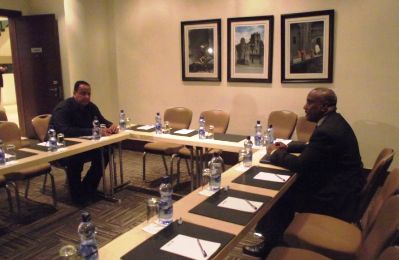Sudan says rebels rejected African Union invitation to resume talks on Two Areas
August 30, 2014 (KHARTOUM) – Sudanese presidential assistant and government chief negotiator Ibrahim Ghandour said the rebel Sudan People’s Liberation Movement-North (SPLM-N) has declined an invitation by the African Union mediation team to resume talks on the Two Areas at the end of this month, expressing concern over the long suspension of talks, which have been on hold since April.

He said the AUHIP is consulting with both parties on resumption of talks, adding that the SPLM-N expressed reservation without stating objective reasons.
However, the SPLM-N lead negotiator, Yasser Arman, in statements to Sudan Tribune on Sunday dismissed statements by Sudanese officials about the resumption of peace talks in Addis Ababa, saying the mediation invited them for a consultations meeting on the national dialogue.
He said they did not receive an invitation to any negotiations between the SPLM-N and the Sudanese government on the Two Areas, describing the government statements as “inaccurate”.
NCP WON’T ACCEPT PRECONDITIONS
In a separate context, Ghandour in statements on Saturday rejected what he called conditions put forward by the rebel Sudan Liberation Movement-Minni Minnawi (SLM-MM) to engage in the national dialogue.
“We welcome anyone who lays down arms and engage in the national dialogue, but we wouldn’t accept any preconditions,” he said
Ghandour, who addressed the ruling National Congress Party (NCP) youths meeting on Saturday, said the government call for national dialogue was not a result of weakness or fear of economic collapse but was motivated by a genuine vision that one political party couldn’t build the country alone.
He said that rebels failed to achieve their political and personal agendas through armed struggle, urging them to seize the historic opportunity and ignore voices which tell them that they would inherit the country because the “gun” will not help them achieve their goal.
The SLM-MM on Thursday agreed to engage in dialogue provided that it was serious and comprehensive and leads to a fundamental change in the governance components, policies and composition.
DIALOGUE CONFERENCE
Ghandour disclosed that the national dialogue committee, known as 7+7, comprised of government parties and opposition ones, and would kick off the dialogue conference on Sunday.
He said the committee would agree on the dialogue’s General Secretariat, national facilitators, criteria for selection of national figures participating in the dialogue besides other issues which he did not reveal.
Earlier this month, the 7+7 committee signed a framework agreement on national dialogue, including its basic principles, requirements, objective and a mechanism to implement its outcome.
The member of the committee from the opposition side, Fadl al-Sid Shuaib, disclosed in press statements on Thursday that the committee agreed to select 15 members to the national dialogue General Secretariat and 50 others to the general convention equally from government and opposition parties.
VISIT TO GERMANY
The NUP official said his visit to Germany was fruitful, noting that he managed to reach common understandings on bilateral relations between the two countries.
He pointed that Germany has strong desire to strengthen ties with Sudan, underscoring their readiness to cement these relations.
During his visit to Berlin last week, Ghandour met with German foreign minister Frank-Walter Steinmeier in talks that dealt with bilateral relations.
He briefed Steinmeier about Khartoum’s efforts for the success of the dialogue and urged Germany to play a constructive role in supporting the issues of Sudan, particularly on foreign debt relief.
He stressed the government’s commitment to provide sufficient safeguards for rebels and political opponents to participate in the dialogue inside the country.
For his part, Steinmeier underscored Berlin’s support for the national dialogue process, pointing to the need to address human rights issues and the importance of the next phase in the history of Sudan and the role it can play in the region.
(ST)
